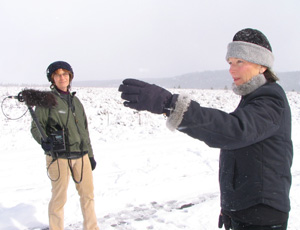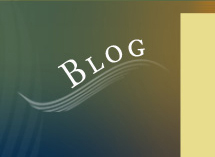Producer's Journal: Martis Valley & the Power of Place
This is the first in a series of postings that I and co-producer jesikah maria ross will write about creating an independently-produced public radio documentary for our California Council for Humanities-funded project, Saving The Sierra: Voices of Conservation in Action. We plan to distribute an hour-long piece for broadcast on Earth Day 2008. And that means we're already deep into production on the segments that you'll hear when it airs.
One of the stories we'll tell is about what happened after the landmark settlement of a community-wrenching lawsuit brought against several developments by environmentalists seeking to limit the resort community boom in the Martis Valley.
This 25,000-acre sagebrush and pine valley lies between Lake Tahoe and the town of Truckee in the northern Sierra. One of the developers I spoke to called it one of the jewels of the Western US. The way he said it, I believe he didn't just mean it in terms of its profitability to his company. An environmental activist we spoke with could tell us where she rode horses as a girl, where she and her brother dug worms and fished. This place is special to each of them in different ways. 
Image of me recording businesswoman and environmentalist Stephanie Olivieri in the Martis Valley this February.
We hear over and over from people across the Sierra, who love their places, that theirs is the jewel, the last best place, a real rural community, a special place that deserves saving. So, how do we as radio producers convey the importance of that people-to-land connection? Because even though I've heard it dozens of times, it never sounds cliché. It's NOT a cliché to those who feel that connection enough to take a stand in their communities. It becomes the bedrock of their conviction and the motivation for sticking it out through endless policy meetings, heated community forums, and expensive, drawn-out legal battles.
And I take responsibility in my broadcast and Web work for conveying the dignity of that connection in a way that impresses folks who can't imagine such a feeling and inspires those who do feel a connection to somewhere, to do something about it.
That's how I came to co-direct this project. I live 4000' up the western slope of the Sierra. I've been here for 15 years; coming here directly from Washington, DC by way of Oakland, Los Angeles and a tiny town in Minnesota where I grew up. I came here when I was done living in big cities and looking for a place to call home.
Now that I've been a Sierran for a decent number of years, I finally feel ready to contribute something to the conservation effort going on throughout this 400-mile long mountain range. And what I can do is tell the stories of folks who settled those lawsuits, sit in those meetings, and talk to each other about the values they share as they make their communities work.
I know you'll be interested to learn how they work it out in the Martis Valley. And I'll be glad to tell you, just as soon as we produce the story for radio. Back to the studio!
Meanwhile, you can read this article from the San Francisco Chronicle about the collaborative efforts to buy up open space in the Valley.














stories to deepen the connection
Like Genevieve, i've also been pondering what it is that bonds us to a place. Is it time? A particular experience? The people? What we do there (or don't have to do/experience there, e.g., traffic, noise, psychic chaos). A combination?
I've lived in Davis for about 25 years, and it seems that as the town grows and changes I feel less bonded with the place, though spending so much time here has certainly deepened my connections to more people, the land (especially the property i now own and cultivate!), local issues, traditions, and such.
On the other hand, i have spent relatively little time in the Sierra--camping trips, vacations, mental health days!--over the past 25 years, yet whenever i'm there i feel a sense of wonder, inspiration, and rejuvenation that clings to me when i leave and endlessly tempts me back. My experiences and feelings for different parts of the Sierra move me to want to conserve it and support others who are doing their part to maintain it's cultural and natural resources. Sometime i feel a greater sense of belonging to the Sierra than my current or old hometown.
So maybe for me it is more the experience of the place than time spent there. But through this Saving The Sierra project, it is also the stories folks are sharing with me that is linking me to the place, making me feel more and more like i belong.
My experience with hearing folks stories from around the range echos what Genevieve said: stories help you start to love a place. And i think that is because stories really do have a unique way of connecting with our hearts as well as our minds. Most stories about a place are about relationships--to a particular spot, to people, customs, lifeways, dreams. And relationships are something we can all be curious about, relate to, or resonate with.
It's come up a few times during this project that people only save what they love. So if stories help us learn to love a place, then maybe our project will go a long ways toward helping to build a community of folks that love and, as a result, will work to save the Sierra for future generations.
jesikah maria ross, Co-Project Director Saving The Sierra: Voices of Conservtion In Action
how to foster place in a mobile world
Catherine really touches on something that I have been thinking about a lot lately--moving around and sense of place. How does one find a deep connection when we move around so often? Can we find a sense of place in the city, a home that has some green mixed in with the buildings and roads and sidewalks?
I have moved every two years since I graduated from College six years ago. I am constantly learning to love a new place and then it is gone from me, and I am another 1,000 plus miles away. I am alternately jealous and in awe of those like Stephanie Olivieri, who can walk to the places she dug worms as a child. So many memories and roots are laid down, provide initiative and conviction. I think she is a stronger fighter than me and I am trained in environmental studies and community activism. I wonder, though, if it is time that teaches those connections or something more. Perhaps work or play or some other interaction?
From my own experience, it is often the stories that start a love of place. Knowing not just the name of a mountain, say, but a family that lived there once, maybe still lives there now, and a little bit about them.
Genevieve Marsh
A sense of place...
Post new comment